Nobody can make a game about World War I. Trench warfare is too boring. Nothing really happens. There isn't a strong, identifiable villain or good versus evil struggle.
Those are among the many excuses that people made for why all the video games are about World War II, and never about World War I. And then the gaming public and journalists got a glimpse of this:
The teaser trailer for Battlefield 1 was a smash hit.
That teaser trailer was damn good. People were excited. I haven't played a first-person shooter since Call of Duty: World at War, I generally hate online shooters, but even I was excited to try out this game! And other people were hyped about it too.
Now, I never really bought into the idea that World War I was "not video game material". I've long advocated for games to look at all periods of history for inspiration, and World War I is a monumental moment in world history that certainly deserves to be examined by games. The indie market certainly realized this, with games like Valiant Hearts and Verdun. But the big publishers have completely shied away from "The War to End All Wars".
This is a shame. The rapid technological advancements and radically new military tactics that evolved leading up to (and during) the war could be great material to examine in the form of a game. The widescale industrialization of warfare, the complicated politics, and the general fuzziness of the morality of the war are also ripe source material for dramatic storytelling. So it's about time to see this war thrust into the mass market spotlight.
I'd prefer to have seen a strategy game along the lines of Total War; but whatever, I'll give DICE and Battlefield 1 a chance.
UPDATE: 12 MARCH 2018, Better than I gave it credit for:
After having played Activision's Call of Duty: WWII and (especially) EA's Star Wars:
Battlefront II, and having talked about it with friends, I have gained a bit of respect for the successes that Battlefield 1 has been able to accomplish. I've started to like it more in retrospect. Not enough to go back and re-play it or try out any of the expansions (yet), but I do feel that I may have been a bit too harsh on the game in retrospect, especially with regard to its campaign vignettes.
I'm not going to change my original review score, but compared to CoD:WWII and Battlefront II, this game probably deserves a slightly higher grade. So keep that in mind as you read the following review. Of all the big-budget first person shooters that I've played in the past couple years, Battlefield 1
is probably the one that I most enjoyed, and it's the one that I would recommend.
The futile indifference of war
First impressions were actually pretty damned good. I was actually really impressed with Battlefield 1's campaign tutorial. It's basically a guided tour of the game's various core mechanics: shooting at enemy soldiers, capturing victory points, piloting vehicles, and so forth. It does a good job of introducing each of these mechanics and systems by jumping the player around between multiple characters in a large-scale battle.
But what really stuck out to me was how the tutorial transitioned between these different set pieces, and how it handled player death. This tutorial is actually surprisingly merciless and difficult. As you complete one set piece, the game gradually (and subtly) increases the threat until it becomes overwhelming and your character dies (or they just kill you after a timer expires), which allows the game to teleport you to the point of view of another character for the next set piece. The dying character's name and birth / death years are shown on screen during the transition, granting that character with a certain degree of humanization.
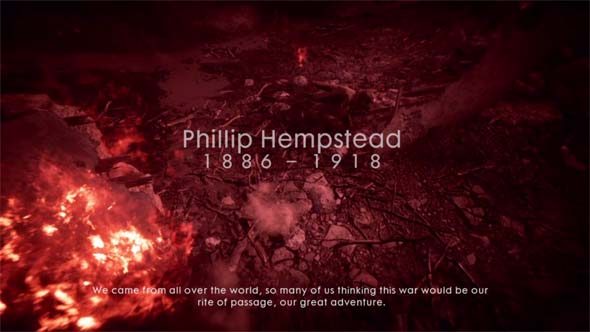
The excellent tutorial emphasizes the indifference and futility of "The War to End All Wars".
Depending on how good you are at the game, you'll go through between half a dozen to a dozen different characters, each with a name and an age. And they all die. The tutorial makes this war look brutal and futile. It even has an almost Dark Souls-like indifference to the player character, killing you without a second thought and forcing you to respawn as another poor, dumb bastard who's about to die for his country, rather than restarting you at a checkpoint until you get it right.
I even wish DICE had gone a bit further by also displaying the character's birth place and maybe even a snippet or two of other biographical trivia. Maybe listing some hobbies, or saying that he was on his high school's varsity football team, or some other little detail like that. DICE settled for just the name and birth / death year, but it's still effective and establishes a very strong running theme throughout the tutorial. The point is a bit undercut by the rapid pacing and by how conventional the actual running and shooting feels. But I still walked out of this tutorial excited by what the rest of the campaign had to offer.
Vignettes of the war
And then the actual campaign started, and it was a real letdown.
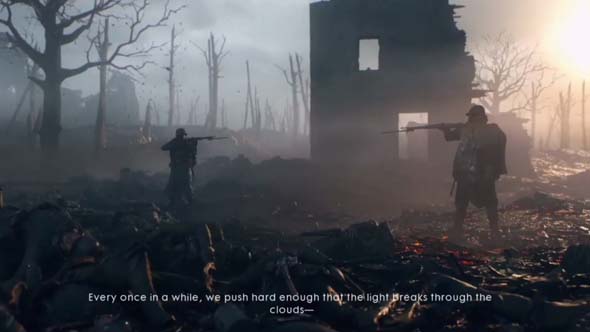
The cutscene book-ending the tutorial frames the Germans as just soldiers fighting a senseless war,
but then they are still typecast as the villains throughout the entire rest of the game.
This is mostly due to the fact that most of the campaign missions eventually degrade into run-of-the-mill solo infiltration missions -- the same stuff that we've been doing since the first Medal of Honor released on the Play Station in 1999. Heck, the poor Germans are still being typecast as the bad guys, even though the moral standings of the various factions of World War I are much, much murkier than in World War II. Would it really have been too much to ask to let us play as a German or Ottoman soldier for at least one or two missions? In any case, other than the change in graphical fidelity, stealth melee kills are the only real change-up to this nearly 20-year-old formula.
It's the large-scale battles that are the stand-out highlights of the game, and it's disappointing and frustrating that such battles don't make up more of the single-player experience. I could understand the Laurence of Arabia mission being a stealthy solo op, since guerrilla tactics are the entire conceit of that mission, but the rest of the missions felt like they deserved better. Each mission has one or two of its 4 chapters devoted to large-scale battles, but these chapters generally only last 10 minutes each. The other chapters are generally just half-hour, linear corridor-crawls through trenches, fortresses, or tiny European villages, sneaking up on Germans (or sometimes Ottomans) and hitting them in the back of the head with a shovel before eventually being shoe-horned into a gunfight.
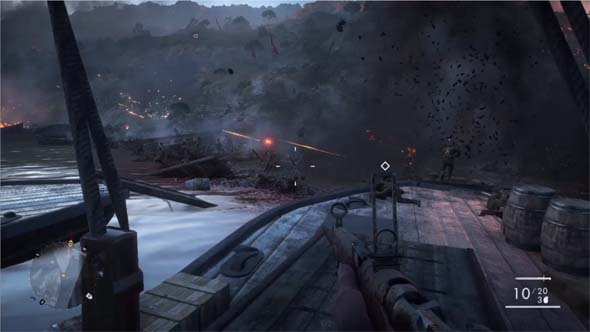
The large-scale battles are the highlight, but are disappointingly few and far-between.
For example, the first mission is about a British tank crew, and the opening chapter of the mission throws us right into the middle of a large offensive. The tank rolls over trenches, flanked by at least two other tanks, with dozens of little infantry men running around shooting at each other (and doing a really good job of not getting run over by my tank). You're tasked with mowing down German infantry with your machine guns, maneuvering yourself into position to take out several series of artillery with your cannon, and occasionally dueling with some German tanks, all while planes do strafing and bombing runs overhead. It's good stuff.
Too bad it only lasts for about 10 minutes before the entire British army seemingly vanishes into thin air, your tank gets stranded behind enemy lines in a foggy forest in which the tank spotters can't see their targets, and you are tasked with having to single-handedly clear out the ensuing German trenches and bunkers in order to make way for the tank to proceed. Then the tank breaks down and you have to single-handedly procure replacement parts that are conveniently located in the occupied village just over the hill. Then you get one last "boss battle" as your tank stands solo against a few waves of German tanks.
A large-scale tank battle gives way to a solo stealth infiltration of the German trenches and villages.
I do appreciate that the campaign is divided up into a series of vignettes. This allows the player to assume the role of different characters at different important places in the war, rather than trying to contrive a reason for a single character to show up at all the important points in history and single-handedly decide the outcome of the war (I'm looking at you, Assassin's Creed!). Unfortunately, each vignette is only about an hour or two long, and there's only five of them (six if you count the tutorial). So the characters end up being really shallow, the scenarios often feel contrived and cliche, and everything feels very limited in scope.
And when the game isn't going out of its way to be cliche, it's actively making fun of itself for being cliche. The "Friends in High Places" protagonist has an eye-rolling and thoroughly undeserved redemption arc, and the mission ends with an over-the-top shootout on the top of a German zeppelin. I was face-palming through much of the second half of this mission, but DICE bails itself out with a narrative twist in the final cutscene of the mission that actually justifies the absurd antics and dramatic changes in tone.
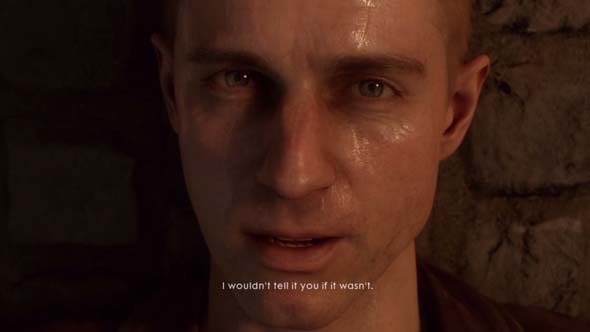
"Friends In High Places" has a last-moment twist that justifies its cliche character arc and over-the-top conclusion.
After "Friends in High Places", it was a bit hard to take any of the following missions seriously, and there was always the sneaking suspicion that another "unreliable narrator" plot twist might be right around the corner. This was especially true in the Laurence of Arabia mission. The title cards tell us that Laurence's deeds are still controversial to this day, but the actual mission put the player up against a silly villain who seemed to be pulled straight out of a Saturday Morning Cartoon.
The campaign isn't all bad though, and there is some merit to its writing and design. The introduction to the tank and plane missions highlight how unreliable the machines are, and the tank level (in particular) has you constantly stopping to repair the damned thing, while also framing the tank itself as sort of the villain of the entire piece (rather than the opposing army). So it isn't that the campaign is completely devoid of merit; it's just that it feels a bit rushed and isn't very effective at playing to the game's actual strengths, which are the large-scale battles.
But nobody's here for the single-player campaign
Admittedly, the missions aren't really here for the missions' sake. They are here to act as glorified tutorials for individual mechanics in the game's multiplayer mode. Because let's face it, even though there is a single-player campaign, Battlefield 1 is really just an online shooter. I'd much rather have played the game on PC so that I wouldn't feel hindered by being stuck with a gamepad for competitive multiplayer, but that would have required me to install EA's Origin (and I'm still sour from my SimCity experience). Besides, if I wanted to play on PC, I would actually have had to buy the game, instead of getting a cheap, used copy off Ebay.
I'm not a big fan of online multiplayer, nor am I particularly good at it. The extent of my online experience basically starts and ends with Dark Souls, and I'm not even particularly good at that game's PvP. So I'm not exactly an authoritative figure when it comes to judging online multiplayer. If you're a big online shooter aficionado, then you might dismiss this review as just a bitter n00b who needs to shut up and "git gud". I'm not going to pretend that I'm better at these games than I actually am, nor am I going to blame the game for my sucking. But if you've never really gotten into online shooters, then this review is probably more geared for you. And if you are an experienced shooter gamer, then perhaps this review will give you some insight into the perspective of an outsider.
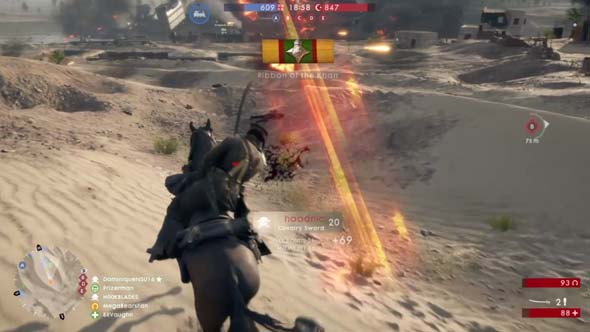
Cutting other players down from horseback was pretty much the only reliable way for me to get kills.
I never played the older Battlefield games, nor have I put much time into the online multiplayer of Call of Duty. I've played a bit of games like Star Wars: Battlefront (also made by DICE) and Metal Gear Online. I've heard that the Battlefield games have historically been pretty good, and that they're known for having large, sandbox-style maps that allow for large-scale battles using creative, ad hoc tactics.
Anyway, the single-player campaign is almost worthless as a tutorial for the multiplayer. The game doesn't really bother to explain even the most basic of concepts. Once I realized that I couldn't hit opponents worth shit, I tried playing as a medic in the hopes that I could at least be somewhat useful to my team. It took me a while to figure out how to revive people, as I was expecting it to be done by holding the Square button (which is the default "action" button for everything else in the game). But no, it's a special piece of equipment that requires you to switch away from your weapon and turns you into a sitting duck. This would be fine if not for the fact that all medic actions happen in the midst of battle, rather than behind the lines where it's relatively safe. So I'd run up, heal somebody, and then promptly get my brain filled with lead. So it's only a worthwhile tradeoff if the player I revived is better at shooting enemies than I am (which is admittedly, very likely).
I spend most of my time in multiplayer staring at the death and respawn screens.
And this highlights one of the core reason why I usually don't bother with online games: I don't know how to play them. First of all, I don't like first-person shooters because of how restrictive the camera is and how limited my situational and environmental awareness becomes. Another core problem for online shooters (both first and third person) is how much the games reward mobility. People run around shooting from the hip with uncanny accuracy because (as far as I can tell) there's no penalty for doing so; whereas using the sights to aim slows you down and makes you a sitting duck. So the games usually punish you for trying to play slowly and deliberately, which is how I approach virtually every game that I play.
The barrier of entry for even being competent in such games is usually pretty high, and this game affords virtually no opportunity to practice or learn the game before throwing you right in. I spawn, I wander into a skirmish, I promptly die because I can't find anybody to shoot before they've already shot me. And even if I do see an enemy, they've already sniped me in the head before I can line up a shot. Or I shoot them 10 times square in the chest with a rifle, but they don't die, and then insta-kill me with a single shot from a pistol. It's a very sink or swim mentality -- for me, it's mostly sinking. It's also not very conducive to learning. For someone who hasn't been subsisting off of every such game that comes out, it's a very deterring experience. First of all, it isn't fun to play. Secondly, it's kind of embarrassing.
Single-player holds the player's hand and guides you through the whole game, but as soon as you boot up multiplayer (and your competency is now directly affecting the enjoyment of other players), the game acts as if you must be an expert because you even bothered to boot up the mode. Yeah, sure, the single-player had a bit where I stand around a flag mowing down Krauts with my tank, but that hardly qualifies as teaching how to play online. The single player never teaches how to revive people as a medic. It never teaches how to act in a support role. Heck, even the controls for piloting vehicles are different between the single-player and multiplayer modes! I'm really curious to learn DICE's justification behind that last one... Anyway, the experiences are so fundamentally different that beating the campaign doesn't remotely translate into multiplayer competency -- let alone success.
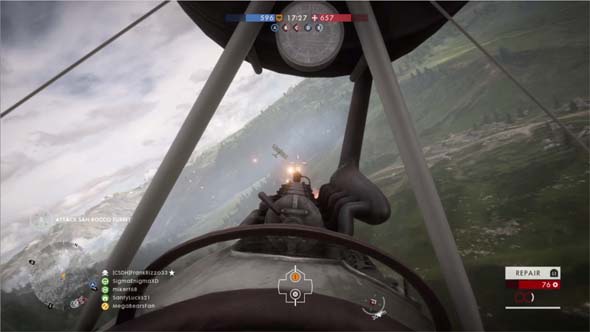
Why are the controls for flying a plane different between single-player and multiplayer?!
A lot of this would be alleviated if there were even some rudimentary tutorials for the mutliplayer. At the very least, having the option to create an offline bot match would be nice. That way, a total n00b like me could at least learn some of the arenas, experiment with the various role tools, and hop into the cockpit of a plane to learn the damned controls -- all before throwing myself into live-fire with other players, where I'm just going to die in five seconds anyway (and therefore don't really have an opportunity to practice anything other than the damn deployment/respawn screen).
Micro-transactions and gradual unlocks undercut the WWI setting
But even if you do catch on quickly, the game still holds you back with its progression structure that is tied to pay-to-win micro-transactions. When the best gun that I have for a certain class is a bolt-action rifle, and everyone else is armed with heavy machine guns, I feel like maybe my lack of skill isn't the only reason I have a 1:6.5 kill-to-death ratio. Since these games want the player to feel like there's a sense of progress to their otherwise completely-structureless multiplayer, you have to -- very slowly -- unlock weapons and gear that will give you a fighting chance.
You either have to grind for days to earn enough levels and in-game currency to buy these upgrades, or you have to hand over your credit card number. After my first weekend of play, I was still only level 4 and had only earned enough in-game currency to buy one new gun and one new support tool for one of my character classes. Even if you do decide to pony up the dough, you're still basically just gambling, because the gear you get is randomized. Or you can hope for random loot drops at the end of matches, but I only ever received skins for guns I hadn't even unlocked yet -- so completely pointless.
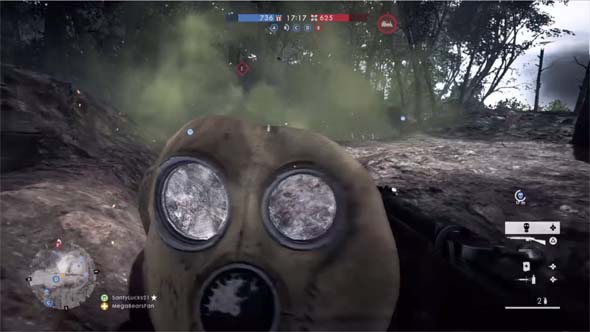
The occasional gas grenade is about the only thing that reminded me that this is supposed to be a WWI game.
Of course, once everyone is running around, armed to the teeth with gold-plated machine guns, the game quickly loses its World War I luster. If not for the zeppelins flying overhead and occasionally having to put on my gas mask to avoid damage from a gas grenade, it was easy to forget that this is supposed to be a World War I game.
The Operations mode is maybe the one saving grace, as it actually provides some context and even feels like an actual battle, with the respective armies gaining and losing ground. It's like a miniature multiplayer campaign across several battles. Unfortunately, I had trouble staying connected to a game for the duration of an operation.
The gameplay is still too fast and too frantic for my tastes, and the multiplayer doesn't even seem to bother with any actual trench warfare (aside from maybe the Argonne Forest, which is the only map in the game that I actually like). The actual online arenas don't feel large enough for the combined arms engagements that the game seems to want us to be playing. Flying a plane in a straight line for just a few seconds can easily take you out of the combat arena. I also haven't seen any naval presence at all. It might have been cool to have playable ironclads or dreadnoughts duking it out off the coast, and players being able to spawn on the ships in order to take over the guns in order to shoot the other ship(s) or shell the enemy on land, or to defend some convoys from U-Boat wolfpacks (yes, U-Boats were in World War I, too). But such is not the case.
I still hope that Battlefield 1 does well
Battlefield 1 isn't a bad game. It does some things very well. But it's very uneven, and even the things that the game does well are tempered with disappointment, missed opportunity, and a general lack of content. In addition to not being able to play as a Central Power, the French and Russians are also auspiciously absent, and the game doesn't touch on the imperial colonies in Africa and southest Asia. While I'm generally disappointed in the lack of originality in the actual game, I do hope that Battlefield 1 performs well.
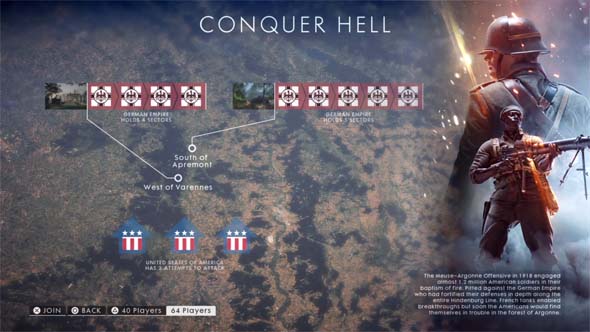
Operations provide some historic context and do a better job of feeling like an actual battle.
Success for this game might encourage other developers and publishers to look outside of WWII, Vietnam, and the Persian Gulf for historical inspiration. We've recently seen a handful of big-budget games with novel historical settings. Red Dead Redemption launched a short-lived craze for Western-themed games. Assassin's Creed III and Black Flag put us in the middle of the American War for Independence and the golden age of pirates (respectively). Ryse: Son of Rome put us in control of a Roman legionnaire. Far Cry: Primal even took us back to the stone age. And now Battlefield 1 gives gamers a look at World War I. In each case, the gaming public seemed to be excited for these opportunities to play in these new settings that most gamers aren't familiar with. Even though the quality of the actual games was very hit-or-miss, each game showed that there is an audience for history-themed games.

I hope that the hype and success of Battlefield 1 leads other publishers to consider financing games that take place in other historical settings that are rare for AAA gaming to explore. Perhaps now, games based on the Naploeonic Wars; the golden age of sail; the American Civil War; ancient Greece, Rome, Egypt, or Persia; feudal Japan; the Viking Age; and so forth could all see the financial backing and advertising of large publishers. I think that opening the doors wide to new periods of history could only be a good thing for video games. Hopefully those new games will be more creative and do a better job of actually using their historic setting to create novel gameplay systems.
In the meantime, I'm still waiting for Creative Assembly to give me a Total War game about the American Civil War...